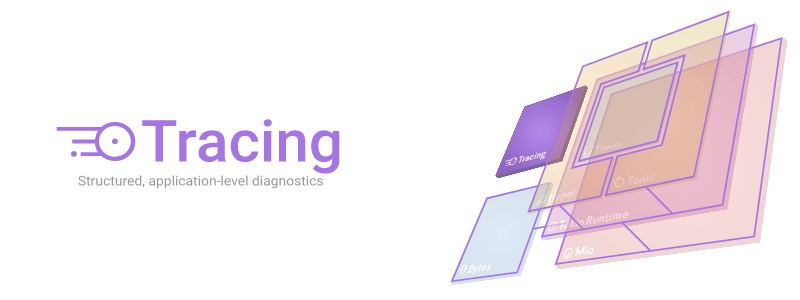35 releases
| 0.1.33 | Nov 25, 2024 |
|---|---|
| 0.1.32 | Oct 13, 2023 |
| 0.1.31 | May 11, 2023 |
| 0.1.30 | Oct 6, 2022 |
| 0.1.2 | Jul 10, 2019 |
#592 in Debugging
13,077,373 downloads per month
Used in 41,149 crates
(211 directly)
225KB
3.5K
SLoC
tracing-core
Core primitives for application-level tracing.
Overview
tracing is a framework for instrumenting Rust programs to collect
structured, event-based diagnostic information. This crate defines the core
primitives of tracing.
The crate provides:
-
span::Ididentifies a span within the execution of a program. -
Eventrepresents a single event within a trace. -
Subscriber, the trait implemented to collect trace data. -
MetadataandCallsiteprovide information describing spans and events. -
Field,FieldSet,Value, andValueSetrepresent the structured data attached to spans and events. -
Dispatchallows spans and events to be dispatched toSubscribers.
In addition, it defines the global callsite registry and per-thread current dispatcher which other components of the tracing system rely on.
Compiler support: requires rustc 1.63+
Usage
Application authors will typically not use this crate directly. Instead, they
will use the tracing crate, which provides a much more fully-featured
API. However, this crate's API will change very infrequently, so it may be used
when dependencies must be very stable.
Subscriber implementations may depend on tracing-core rather than tracing,
as the additional APIs provided by tracing are primarily useful for
instrumenting libraries and applications, and are generally not necessary for
Subscriber implementations.
Crate Feature Flags
The following crate feature flags are available:
-
std: Depend on the Rust standard library (enabled by default).no_stdusers may disable this feature withdefault-features = false:[dependencies] tracing-core = { version = "0.1.33", default-features = false }Note:
tracing-core'sno_stdsupport requiresliballoc.
Supported Rust Versions
Tracing is built against the latest stable release. The minimum supported version is 1.63. The current Tracing version is not guaranteed to build on Rust versions earlier than the minimum supported version.
Tracing follows the same compiler support policies as the rest of the Tokio project. The current stable Rust compiler and the three most recent minor versions before it will always be supported. For example, if the current stable compiler version is 1.69, the minimum supported version will not be increased past 1.69, three minor versions prior. Increasing the minimum supported compiler version is not considered a semver breaking change as long as doing so complies with this policy.
License
This project is licensed under the MIT license.
Contribution
Unless you explicitly state otherwise, any contribution intentionally submitted for inclusion in Tokio by you, shall be licensed as MIT, without any additional terms or conditions.
